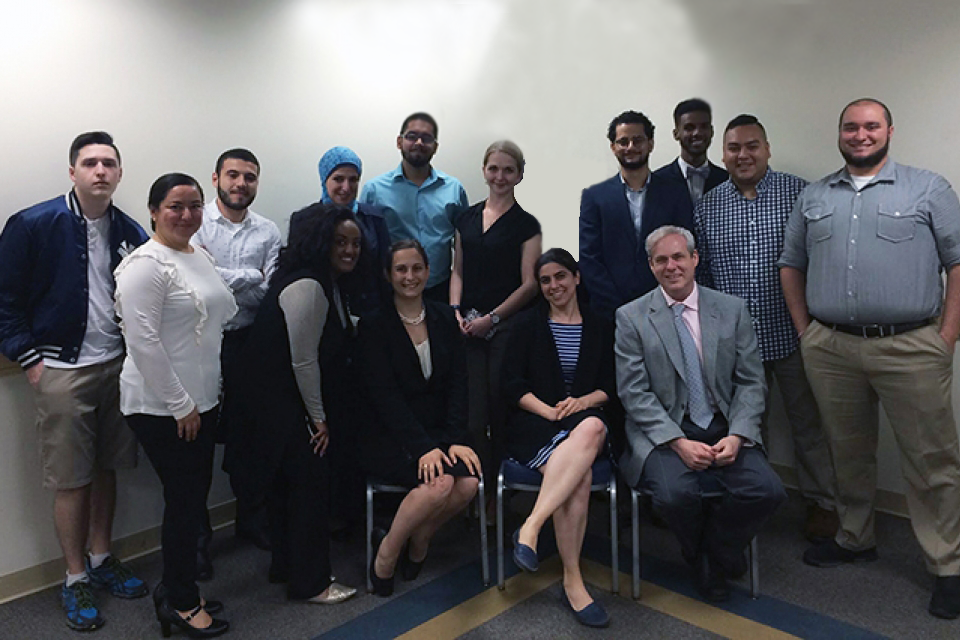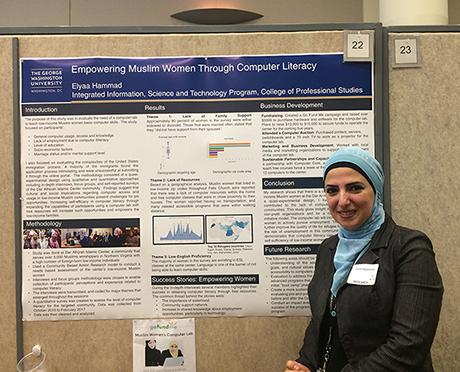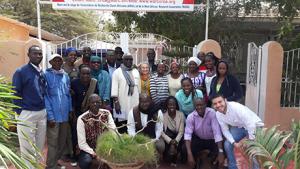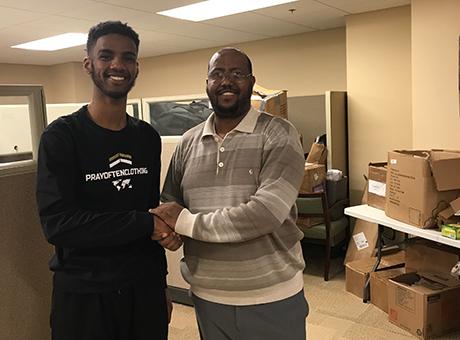From left to right, front row: Servat Bukhari, Delina Desta, Olivia Blackmon, asst. program director; Sara Hooshangi, program director; Scott Tambert, IIST faculty member; From left to right, back row: Patrick Aviles-Wynkoop, Daniel Alvarez Castegnaro, Elyaa Hammad, Amanjot Bhandal, Galyna Ivanystka, Mohammad Mustafa, Abdi Abdirahman, Roberto Solorzano, Martin Gonzalez.
Integrated, Information Science and Technology (IIST) program students used their knowledge of technology to help others by participating in a one-year service learning course. Thirteen of them partnered with domestic and international community-based organizations to design and run hands-on service projects during the 2016-2017 academic year, with the leadership and support of Dr. Olivia M. Blackmon, assistant program director and faculty member of the IIST program.
The students presented eight capstone projects to community organizers, GW faculty, and administrators at the Spring 2017 Academic Service-Learning Symposium in May, organized by the Honey W. Nashman Center for Civic Engagement and Public Service. The Nashman Center works closely with GW to integrate civic engagement into GW’s educational work and meet community needs beyond the campus. The hands-on student service projects took place in the D.C. metro area, as well as Senegal and Guatemala. The IIST students logged their volunteer hours with the Nashman Center to enter the competition for the President’s Volunteer Service Award, with two of the projects winning this distinction.
Additionally, Dr. Blackmon received the Nashman Grant for Community Engaged Scholarship and presented about her plans to expand fledgling community partnerships and develop a cross-departmental curriculum to teach Community-Based Participatory Research, program evaluation and field research around technology and humanitarian aid.
All of the students are commended for their hard work and strong volunteer spirit on their capstone projects. All of the projects made an impact on others. Some of the projects won awards, as noted, and a handful of the students’ projects will continue indefinitely.
Summaries of the eight service learning projects are listed below.
Empowering Muslim Women through Computer Literacy
Student: Elyaa Hammad
Organizations: Dar Al-Hijrah Islamic Center
Awards: The President’s Volunteer Service, Nashman Center for Civic Engagement and Public Service; KACIF Grant; GoFundMe Scholarship for Public Service; 1st place, GW Research Day, Justice and Economic Empowerment category; GW Alumni Association Prize.
Elyaa Hammad had a vision to build a computer lab to provide free training. She hoped to empower low-income Muslim women to be effective contributors to the advancement of society by providing them with the tools and skillsets for success. Through her community-based research she found these women lacked the necessary computer literacy skills needed for the workforce.
Using a sound business model she raised funding and partnered with Computer Core to develop basic and intermediate computer literacy courses to train Muslim women entering into a career. She worked closely with the Dar Al-Hijrah Islamic Center, which supports the needs of the Muslim community in the D.C. Metropolitan area.
Read more about the opening of her computer center.
Read more about IIST student winners at GW Research Day.
Higher Achievement: Effective Tutoring Strategies for Marginalized Communities
Student: Martin Gonzalez and Taher Deriye
Organization: Higher Achievement
Martin Gonzalez and Taher Deriye volunteered as mentors with Higher Achievement, a non-profit organization that provides mentoring and tutoring for children in grades five through eight with the goal of improving grades, building character, and promoting awareness of social justice issues. They tutored math and literature for students in an afterschool program. The program provided the IIST students with training to develop their skills and techniques to effectively work with disadvantaged communities. Both students enjoyed working with the program, sharing ideas and lesson plans, and gaining instructional experience. Taher said that “this service learning project had an immense impact on my learning experience and created a valuable opportunity to serve low-income students.”
In addition to providing tutoring and support services to students, Martin extended his project to examine the effects of tutoring methods on the students from marginalized communities. His research included an extensive literature review on effective mentoring programs and measurement techniques. Martin’s experience stressed to him “the need for more volunteer programs that provide a continuous approach to education, especially for low-income communities.”
Photo Caption: Martin Gonzalez
Promoting Computer Literacy in the Senior Communities
Student: Servart Bukhari
Organization: Little River Glen Senior Center
Servart Bukhari served this community by providing computer literacy training, which is typically a new skillset for most seniors attending the Little River Glen Senior Center. The center is for adults 50 and older, where they can participate in social, physical, and intellectual programs. Senior centers like this one serve as a vital gateway to connect older adults with others in the community and provide tools for them to stay active, healthy and maintain independence.
After her two-semester course seniors were able to communicate through different platforms including Facebook, Twitter, Instagram, and Skype—essential resources for older adults to connect with family members and friends in this digital age. In addition, she taught seniors how to create electronic greeting cards and proficiently use Microsoft applications.
Servart felt that this service-learning project “positively impacted [her] education journey, as [she] felt the tools [she] learned during the IIST program” funneled to other learning environments. Through this project, she gained “self-awareness, and became confident in [her] ability to” transfer knowledge and “positively impact a community of older people.”
Optimizing IT Usage at West African Research Center in Senegal and World Vision in Guatemala
Students: Daniel Alvarez Castegnaro and Roberto Solorzano
Organizations: West African Research Center (WARC) and World Vision International (WVI)
Awards: The President’s Volunteer Service Award, Nashman Center for Civic Engagement and Public Service; Sigelman Undergraduate Research Enhancement (SURE) Award; 2nd place, GW Research Day, Education, Business and Organizational Studies category.
Through a collaborative effort, Daniel Alvarez Castegnaro and Roberto Solorzano partnered with the West African Research Center (WARC) and World Vision International (WVI) to examine technology readiness, capabilities and capacity of research centers based in Dakar, Senegal and Palestina, Guatemala.
During the fall semester both students worked remotely with the partnering organizations to design a technology assessment tool in both French and Spanish. In January the students visited their field locations to collect data through a mixed methods approach using a quantitative survey, in-depth interviews and focus groups. Their evaluation focused on best-practice guidelines for effective technology implementation in developing countries with limited infrastructure support. Upon returning from Senegal, Daniel stated that the “experience opened [his] eyes to the lack of opportunity and resources that these communities are facing in the field of information technology.” Both Daniel and Roberto will serve as a post-bachelor mentor for students continuing their research during the 2017-2018 academic year. Read more about IIST student winners at GW Research Day.
Development of a Python Course for High School Students
Students: Amanjot Bhandal and Patrick Aviles-Wynkoop
Organization: West Potomac High School (WPHS), Fairfax County, VA
Patrick Aviles-Wynkoop and Amanjot Bhandal created a collaborative partnership with West Potomac High School (WPHS), a public high school drawing its students from economically, racially and ethnically mixed areas in Fairfax County, Virginia, with the students speaking more than 46 languages, to offer a robust after school coding program. For the fall and spring semester the two IIST students designed and taught an engaging course for foundational skills in Python.
Their objective for the course was to be a catalyst “for students to develop analytical thinking, creative reasoning, by creating a fun hands-on environment for learning,” said Amanjot. This service learning experience enabled the students to become effective at teaching basic level coding. Additionally, the student project used hands-on learning projects to teach STEM education topics.
Whitman-Walker Health: Improving Patient Care Through Technology
Students: Galyna Ivanytska and Mohammad Mustafa
Organization: Whitman-Walker Health (WWH)
As Information Technology specialists Galyna Ivanytska and Mohammad Mustafa supported the day-to-day technology system infrastructure for the Whitman-Walker Health (WWH) center. WWH’s mission is to ensure the “highest quality, culturally competent community health center serving greater Washington’s diverse urban community, including individuals who face barriers to accessing care, and with a special expertise in LGBT and HIV care.” WWH offers a variety of services, including HIV/STD testing, behavioral and mental care, youth services, and even a modern state-of-the-art dental office.
The students felt that the internship had an “impact both on their educational and professional experiences,” specifically as they learned more about the issues involved in the Health-IT industry.
Girls in Technology: Supporting Initiatives to Promote Girls in the STEM Field
Student: Delina Desta
Organization: Women in Technology (WIT)
Delina Desta worked with Women in Technology (WIT) to support the advancement of women in technology through mentorship and leadership development. Delina Desta’s role was to assist with the Girls in Technology (GIT) program to support an initiative of over 500 girls who are interested in the pathway to STEM career experience.
Through creative and innovative hands-on STEM programs and educational opportunities, the organization is committed to inspiring girls and women to pursue STEM-related careers. Their program offers seven core beliefs that help girls and women develop and maintain values for achieving success in the STEM fields, which include critical reflection, empowerment, self-efficacy, passion, innovation, collaboration, and leadership.
Desta was a member of the event planning committee and participated in the Girls in Technology Mentor Protégé Program, Girls in Technology Sharing Our Success (SOS) and Girls in Technology Scholarship programs. She conducted in-depth interviews with women in technology fields and found that many “struggled in career paths where men dominated the industry…and where they experienced institutional forms of oppression and prejudices.” Delina believes that the programs offered through WIT and GIT can help break down barriers faced by women in STEM education and careers.
Developing Programs for Humanitarian Aid
Student: Abdi Abdirahman
Organization: United Muslim Relief (UMR)
Abdi Abdirahman partnered with United Muslim Relief (UMR), a non-profit organization that promotes humanitarian coalitions to support the needs of developing countries. UMR focuses on creating sustainable programs for people to have access to clean water, healthcare, basic social services, and workforce development.
Abdirahman worked with a local chapter on the GW Foggy Bottom Campus to assist in a multitude of events. During the fall semester he partnered with regional universities and national book stores to lead six book drives raising donations to support libraries in Somali. This past spring he collaborated with UMR to assist in the annual fundraising banquet to support global Somali refugees and orphan care. Through local chapters, like the one on GW’s campus, UMR’s international initiatives for youth mobilization, trainings, and advocacy are supported nationally and locally.








